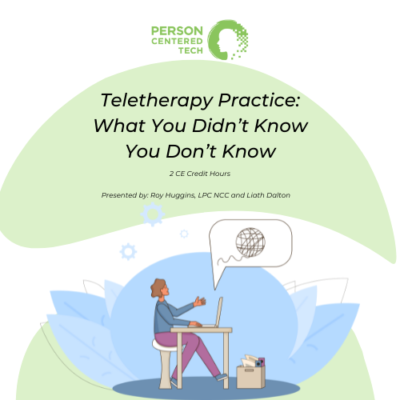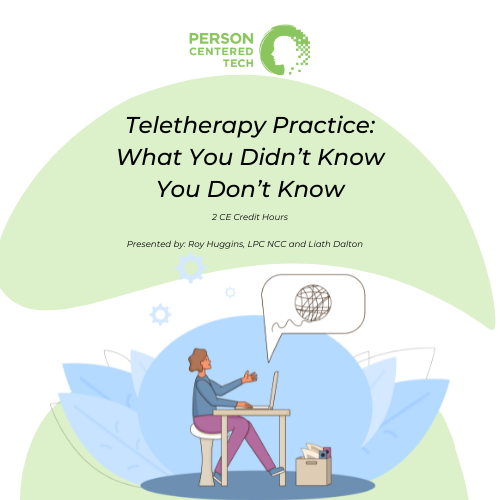Teletherapy Practice: What You Didn’t Know You Don’t Know
2 CE Credit Hours. 1 Legal-Ethical Credit Hour. Continuing Education Session Replay
Presented By: Roy Huggins, LPC NCC; Liathana Dalton
Course Description

This introductory-level course for counselors, marriage and family therapists, psychologists, and clinical social workers will cover areas of teletherapy practice, both technical and clinical, that the Person Centered Tech team has discovered are “blank spots” in the overall knowledge of most teletherapy practitioners. For those who adjusted to teletherapy through self-training, this program will help fill in some knowledge gaps. For those who have taken training, this will be a valuable review (and may still fill a knowledge gap or two.)
This self study course is designed to help clinicians integrate and absorb the information presented. Each module is created in a way that helps clinicians practically apply the information in their work (and helps facilitate change management as clinicians understand the aspects needed to implement the tools provided).
- Built with andragogical principles
- Learning exercises to help integrate the new information
- Practical application knowledge provided by other mental health professionals tailored to real-world practice settings so that you can apply your learning right away
Educational Objectives
- Assess what protocols are needed for teletherapy clients to maintain client safety and therapy benefit
- Change software choices and communications policies to comply with HIPAA and ethical standards
- Set up equipment to improve attunement with video-based clients and reduce therapist fatigue
- Locate resources that guide therapists on current standards of care in teletherapy practice
Syllabus
- The most vital teletherapy informed consent points
- Appropriateness for the medium
- Risk-benefit analysis
- Safety planning
- Lesser-known, but important, tech and HIPAA Items
- Use of email and texting
- Choosing videoconferencing services
- Videoconferencing-based clinical concepts
- Therapist body mechanics, eye contact, and preventing “Zoom fatigue”
- Online Disinhibition Effect
- Resource survey for clinical guidance, telehealth practice management, and telehealth-specific legal-ethical issues
References
- American Counseling Association. (2014). Code of Ethics . Alexandria, VA: Author.
- Suler, J. (1999). Psychotherapy in Cyberspace A Five Dimensional Model of Online and Computer-mediated Psychotherapy [PDF]. Author. Retrieved June 9, 2021, from http://www-usr.rider.edu/~suler/psycyber/therapy.html
- Suler, J. (2004). The Online Disinhibition Effect. Retrieved June 9, 2021, from http://www-usr.rider.edu/~suler/psycyber/disinhibit.html
- US Dept. of Health and Human Services. (2006). HIPAA Administrative Simplification . Washington, DC: Author.
- US Dept. of Health and Human Services. (2013). HIPAA Omnibus Final Rule . Washington, DC: Author.
Presented/Developed By
 Roy Huggins, LPC NCC, is a counselor in private practice who also directs Person-Centered Tech. Roy worked as a professional Web developer for 7 years before changing paths and makes it his mission to grow clinicians’ understanding of the Internet and other electronic communications mediums for the future of our practices and our professions.
Roy Huggins, LPC NCC, is a counselor in private practice who also directs Person-Centered Tech. Roy worked as a professional Web developer for 7 years before changing paths and makes it his mission to grow clinicians’ understanding of the Internet and other electronic communications mediums for the future of our practices and our professions.
Roy is an adjunct instructor at the Portland State University Counseling program where he teaches Ethics and is a member of the Zur Institute advisory board. He has acted as a subject matter expert on HIPAA, security, and clinical use of technology for Counseling licensure boards, and both state and national mental health professional organizations. He has co-authored or authored 2 book chapters, and he routinely consults with mental health colleagues on ethical and practical issues surrounding tech in clinical practice. He served for 5 years on the board of the Oregon Mental Health Counselors Association and then the Oregon Counseling Association as the Technology Committee Chair.
He really likes this stuff.
 Liath Dalton is PCT’s deputy director and a co-owner. Liath is especially passionate about helping therapists be resourced and supported in navigating the security compliance process and identifying the solutions and processes that meet the particular needs of their practices. Liath’s consultation area of expertise is focused on selecting the right combination of services and tech that not only meet the legal-ethical needs of mental health practices, but also the functionality, efficiency, and cost-effectiveness needs as well.
Liath Dalton is PCT’s deputy director and a co-owner. Liath is especially passionate about helping therapists be resourced and supported in navigating the security compliance process and identifying the solutions and processes that meet the particular needs of their practices. Liath’s consultation area of expertise is focused on selecting the right combination of services and tech that not only meet the legal-ethical needs of mental health practices, but also the functionality, efficiency, and cost-effectiveness needs as well.
Program Notices
Accuracy, Utility, and Risks Statement: This program discusses strategies for complying with HIPAA, state rules in general, and covered ethics codes. It may not include information on all applicable state laws. Misapplication of the materials, or errors in the materials, could result in security problems, data breaches, or non-compliance with applicable laws or ethics codes.
Conflicts of Interest: None noted.
Commercial Support: None.
This course is subject to our cancellation/refund policy and complaint policy.

